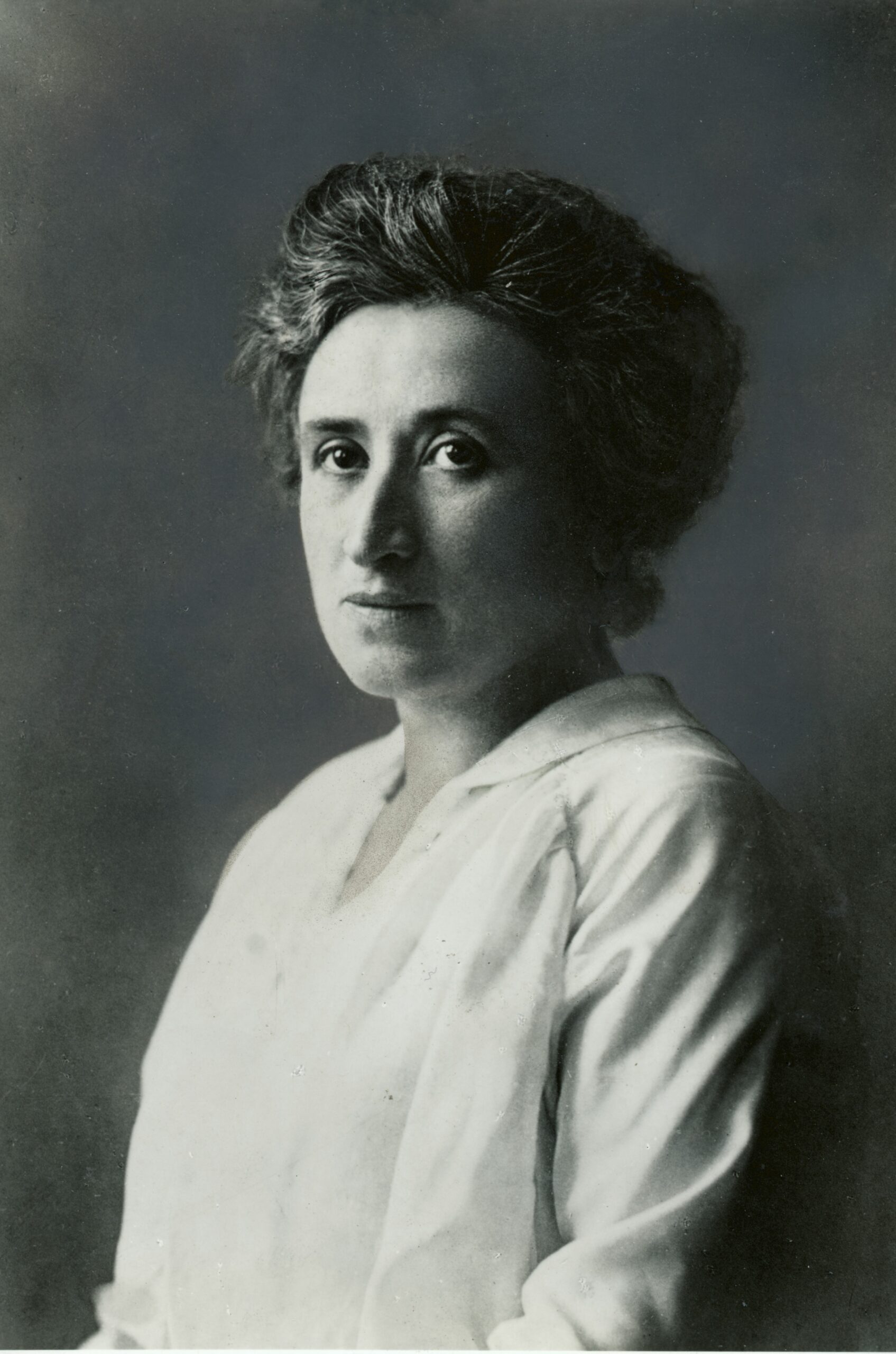Share Twitter Facebook Email Copy URL
Born 150 years ago, the Jewish-German revolutionary’s calls for socialism and democracy are today as relevant as ever

Rosa Luxemburg was an unusual daughter of Jewish-German history, yet shaped it nonetheless. Born in 1871 to a middle-class Jewish family in the small town of Zamość in Poland, her family was, alike to many Jews of her time, influenced both by Polish cultural turns and Jewish life. The Haskalah movement, as well as the ongoing changes to Jewish legal status which had started in the Emancipation, structured the life of the Luxemburg family. Rosa was a thrice-oppressed citizen: once as a Pole under the Russian Tsarist empire, second as a Jewess, third as a woman. She understood viscerally why social democracy must entail rights for everyone. When she was two years old, a misdiagnosed hip disease left her with a lifelong disability. Nevertheless, Rosa was a bright, attentive child, with a wide-reaching understanding of the world, and deep empathy for those around her. The youngest of five siblings, she was the family’s favourite, who were protective of her due to her ill health and brilliance.
Polish was banned in school, and young Rosa was politized early on in the debates around Polish nationalism. An outlier of opinions of both left-wing leaders, including Marx & Engels themselves, as well as right-wing nationalistic sentiments, Rosa objected to Polish nationalism as she thought it wouldn’t enable bringing down the Russian empire—the opinion Marx and Engels advocated in the First International, but would rather strengthen the bourgeoise’s class consciousness in maintaining capitalism. Rosa saw four leaders of the movement she supported, the Proletariat Party, being executed for their opinions, an act which made her sensitive to the need to sustain freedom of dissent as the core of the democratic ethos.
Rising Up the Ranks
Rosa’s brilliance and sharp wit together with passion for social justice motivated her to enrol for a PhD in Zurich. Her supervisor confessed she had already arrived “a fully formed Marxist”. Rosa received her PhD in 1897, only 30 years after the first-ever woman was allowed to study in the University of Zurich. Her time in Switzerland introduced her to some of the socialist leading lights of her era.
In 1898 she made her first big intervention into the international socialist debate when she critiqued Edward Bernstein, Engels’s most famous student, as she authored Reform or Revolution. Bernstein had argued that capitalism would not be overthrown by revolution and that the working class should aspire to a series of reforms instead. Luxemburg attacked this position head on: without the revolution, she argued, socialism loses its central axis. Of course, it is vital to change the present conditions of the working class, but it is essential to keep the revolution as central motivation. Rosa was not the only Jewish woman who attacked (fellow Jew) Bernstein—in London, where he spent much time in exile and became close with the Marx family, Bernstein was attacked for his assault on her father’s legacy by Karl Marx’s youngest daughter, Eleanor Marx. She had decided to edit her father’s seminal text Value, Price and Profit as response to Bernstein’s intervention.
Rosa’s dramatic entrance onto the world stage made her an instant public interest and an equally admired and hated personality. This hyperbolic reception would accompany her life and afterlife. She had made an inevitable physical move to Berlin, where the height of socialist debate was taking place. The SPD, once illegal under the anti-socialist laws, was gaining strength, and had become the biggest party in the Second International, the largest socialist organization of her time. Rosa knew it would be the most crucial place she could influence international revolutionary work. She was driven by integrity and passion for justice and the clear-sighted idea of how to politically affect the most people. The ranks of revolutionary life in Berlin were rich with radical ideas and rebels. Rosa’s milieu was that of foreigners and dissenters, and she found lifelong companions in such luminaries as Clara Zetkin and fellow Jewish women Luise Kautsky and Mathilde Jacob. Rosa herself never made Berlin fully her home. Always a foreigner and outsider, she used this position to extend her compassion and understanding of social justice beyond her immediate environment.
Rosa is often remembered in context of her relationships, especially with her first comrade and lover, Leo Jogiches. She is also often remembered in her longstanding argument with Lenin. Lenin and Rosa’s relationship is one of the most fascinating and misunderstood in radical history. Rosa was always on the side of the Bolsheviks and was a keen supporter of the 1905 Russian revolution, which had influenced her deeply. After the revolution, she wrote The Mass Strike, Party and Trade Unions, which would elucidate her ethos that political and economic strikes are crucial for forming revolutionary consciousness. She was developing a commitment to creation of revolutionary consciousness through strikes: “the mass strike is the first natural, impulsive form of every great revolutionary struggle of the proletariat and the more highly developed antagonism is between capital and labour, the more effective and decisive must mass strike become.”
Teacher and Theoretician
Luxemburg taught at the SPD’s party school, where she honed her thinking and brought to practice her ethos that only through direct education will revolutionary consciousness be formed. She was always a talented agitator who, despite her small frame, was able to capture audiences effortlessly. During her time as a teacher in the workers’ school she developed some of her most important work, including the basis of what would become her book The Accumulation of Capital.
At that time, the SPD was gaining more and more ground as a parliamentary force while becoming more and more centrist in its positions, and Rosa became its left outlier. Specifically, she took her party to task on the matter of its compliance with imperialism. Despite having poor health and not traveling much, Rosa was aware and involved in matters of the world beyond Europe. She had written on the South African war (then known as the “Boer War”) of 1902. Fellow Jewish revolutionary Ruth First, who was a leader in the South African anti-apartheid struggle, commented that Rosa was the first person to understand the war, and that the heaviest price paid for that war was by the native Africans, not the British colonizers.
Thus, Rosa used this time to bring together her intellectual and theoretical critique of Volume 2 of Marx’s Capital with her quest to attack imperialism, including its defences from her own party. She wrote in the Accumulation of Capitalthat capitalism and imperialism went hand in hand; one could not be brought down without the other. Capitalism seeks non-capitalist markets into which to expand, imperialism thus prepares the ground on which capitalism sustains itself. This argument and thesis were greeted with much objection: Lenin critiqued her writing on the people of lands she did not know, in Africa, Australia and Asia, as sentimental and “non-Marxist”. However, Rosa always stuck to her integrity, and dissent never caused her to budge from her position.
A Prisoner of Conscience
When World War I broke, Rosa objected to it fiercely. The SPD had voted for war credits, which Rosa critiqued harshly, leading to another incarceration (she had been imprisoned first after the 1905 revolution). This time, Rosa spent most of the war in prison, but she continued to write and agitate while supported by her friends and comrades. She co-founded the Spartacus League with her closest comrades, including her ex-lover Leo Jogiches and Clara Zetkin; in turn this grouping would become the Communist Party of Germany. In 1915 she wrote in the “Junius Pamphlet”, published under a pseudonym: “Violated, dishonoured, wading in blood, dripping filth—there stands bourgeois society. This is it [in reality]. Not all spic and span and moral, with pretence to culture, philosophy, ethics, order, peace, and the rule of law—but the ravening beast, the witches’ sabbath of anarchy, a plague to culture and humanity. Thus it reveals itself in its true, its naked form.” Talented in oration and powerful writer, Luxemburg never wavered from the cause.
Rosa’s time in prison was not spent in idleness. She kept in touch with revolutionary events, painted, and studied the nature around her in her confined environment—Rosa had always understood the deep connection between woman and nature, man and his environment, and while constrained, this focus had deepened for her. In a now-famous letter to her friend Sonja Liebknecht, Karl Liebknecht’s wife (who was also incarcerated for his revolutionary activity), Rosa wrote:
In the yard where I walk, military wagons often arrive, packed full with sacks, or old uniforms and shirts often spotted with blood…. They are unloaded here, passed out in the cells, mended, then reloaded, and delivered to the military. The other day, such a wagon came drawn by water buffaloes rather than horses. This was the first time that I saw these animals up close. They are built sturdier and broader than our oxen, with flat heads, their horns bent flat, their skulls rather resembling the skulls of our own sheep; the buffaloes are completely black with large soft eyes. They come from Rumania, they are trophies of war…. Anyway a few days ago, a wagon loaded with sacks drove into the prison. The cargo was piled so high that the buffaloes could not make it over the threshold of the gateway. The attending soldier, a brutal character, began to beat away at the animals with the heavy end of his whip so savagely that the overseer indignantly called him to account. “Don’t you have any pity for the animals?” “No one has any pity for us people either!” he answered with an evil laugh, and fell upon them even more forcefully…. Finally, the animals started up and got over the hump, but one of them was bleeding…
The cruelty of sending young men to the front is intertwined with the cruelty of letting animals suffer when they carry their bloodstained uniform back to Germany. Rosa’s understanding of empathy was linked to that of justice. And all struggles were interconnected for her.
A Democratic Socialist Pioneer
Rosa was always proud of her Jewishness, although she mostly stayed away from Jewish politics of her time. Much like the debate on Polish nationalism, in which she was refused to see general ideas arise out of her identity, Rosa understood the world, especially through the eyes of the oppressed, through her own marginalized prism. When sent a book about Spinoza to prison in 1917 by her friend Mathilde Wurm, Rosa wrote: “what do you want with this theme of the ‘special suffering of the Jews’? I am just as much concerned with the poor victims on the rubber plantations of Putumayo, the black people in Africa with whose corpses the Europeans play catch… I have no special place in my heart for the [Jewish] ghetto. I feel at home in the entire world wherever there are clouds and birds and human tears.”
Rosa was a talented letter writer, much in the tradition of the great Jewish intellectual Rahel Varnhagen (whom she cited in a footnote in one of her economic manuscripts). Luxemburg’s worldview was coherent and robust, and she stuck to the causes she believed in whether history proved her right or wrong. Many of the causes she advocated for are still occupying our front pages—she was a woman ahead of her time. Luxemburg was also a pioneer of human rights; she wrote against the death penalty, for rights of prisoners (no doubt, drawing on her own experience), and other struggles which remain current today.
Luxemburg had a close and tense relationship with Lenin. Introduced early on in their revolutionary lives, their debated spanned their respective career. Despite the fact that Luxemburg was a left outlier and Lenin a left leader, many of their sympathies aligned. Luxemburg and Lenin were both fierce revolutionaries who fought for their beliefs without relent. Luxemburg welcomed the Russian Revolution of 1917 heartily. Despite being imprisoned and paying a price in her own freedom due to those revolutionary events, she was aware of their momentous nature. However, she was concerned about the attack on democratic institutions Lenin was orchestrating under revolutionary auspices. For Rosa, democracy and Marxism always went hand in hand, never making concessions to one for the other. Luxemburg’s defence was always of complete social democracy with rights and freedoms for all—she advocated universal suffrage over campaigns for suffrage for women, for instance, and understood that prioritizing one group in the struggle for justice would inevitably lead to a flawed social democracy.
She attacked the silencing of dissenters shortly after the revolution, in a lifelong awareness, gained as a young woman, of the price standing up for dissenting ideas may extort on the individual: “freedom is always and exclusively the freedom of the one who thinks differently”.
Luxemburg was much more critical of the German revolution of 1918–19, despite that revolution bringing her freedom from her incarceration. This historical event, a centre-left attempt at uprising that joined forces with proto-fascist forces, Luxemburg knew, would never amount to a true revolutionary moment. She had penned in 1915; “socialism or barbarism”; and Germany was on the clear path to the latter. On 15 January 1919, at the age of 47, she was murdered, alongside her lifelong comrade Karl Liebknecht, by the Freikorps, a proto-fascist militia which was working in full collaboration with centrist forces in government (and would later support Hitler’s rise to power). A day before her murder, living on the run and in hiding, Rosa wrote in her last ever text, “Order Prevails in Berlin”:
“Order prevails in Berlin!” You foolish lackeys! Your “order” is built on sand. Tomorrow the revolution will “rise up again, clashing its weapons,” and to your horror it will proclaim with trumpets blazing:
I was, I am, I shall be!
Luxemburg’s gruesome murder, in which her mutilated body was thrown into the Landwehr Canal, shocked many around the world. It signalled the beginning of the atrocities that would end with Nazi rule in Germany and the Holocaust; indeed, the Freikorps worked closely with Hitler, and shortly after his rise to power his assault on Luxemburg’s memory commenced. In 1933 the Nazis removed the red star from the grave of Karl Liebknecht and Rosa Luxemburg. Under German fascism, the rise in attacks on Communists and Jews made her closest comrades vulnerable. Mathilde Jacob, Rosa’s beloved right hand, who was responsible for the preservation and publication of much of Rosa’s work, was taken away on 27 July 1942 and deported to the Theresienstadt concentration camp, where she died on 14 April 1943. Like so many, she was not significant enough in the socialist ranks to be hunted by Hitler and the Nazis for her politics, but she suffered for her Jewishness, like all of her and Rosa’s brethren in the 1930s. Luise Kautsky died in Auschwitz at the age of 80 from a heart attack.
Rosa Luxemburg remains one of the most influential thinkers and leaders of the twentieth century. Her deep commitment to justice makes her revered and frightening at the same time. But Rosa’s compassion and deep understanding of suffering lead us still today in our quest for social justice. In 1913 she wrote, “history will do its work, see that you, too, do your work”. Today, this calling is more urgent than ever.
Dana Mills is the author of Dance and Politics: Moving beyond Boundaries (Manchester University Press, 2016), Rosa Luxemburg (Reaktion, 2020) and Dance and Activism: a century of radical dance across the world (Bloomsbury, 2021). She is a member of the Rosa Luxemburg Complete Works editorial board. The article was first published on rosalux.de.



